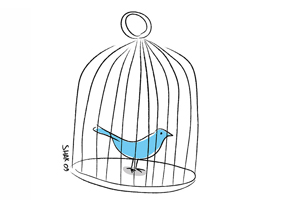
<a href="http://www.flickr.com/photos/kick_start/558283052/sizes/m/in/photostream/">kick_start</a>/Flickr
A new Freedom House report has uncovered increased threats to internet freedom worldwide. It’s no news that politically restrained countries like China, Iran, and Burma are among the worst offenders, but as the report details, similar practices are fast spreading. Some surprising findings:
- Even relatively democratic countries—notably Brazil, India, Indonesia, South Korea, Turkey, and the United Kingdom—are seeing increased threats to internet freedom, such as “legal harassment, opaque censorship procedures, or expanding surveillance.” In many cases, censors target content related to illegal gambling, child pornography, or inciting violence, but censorship incidents are also politically motivated. South Korea, for example, blocked access to some 65 websites related to North Korea, including the official North Korean Twitter account launched in August 2010.
- Arrests of online activists are on the rise. In 23 of the 37 countries assessed, a blogger or other internet user was arrested for content posted online. Authorities in Vietnam sentenced four activists to a total of 33 years in prison for posting human rights violations and pro-democracy views on the internet.
- In all the countries studied, governments made decisions about restricting internet content arbitrarily and without transparency. Even in democratically governed countries, censorship decisions are made without public discussion, and appealing the decisions “may be onerous, little known, or nonexistent.”
- If you thought Egypt’s internet shutdown in January was bad…in recent years 12 of the 37 countries were known to exploit their control over telecom infrastructure to restrict access to politically relevant information.
- More websites, activists, and dissidents are self-censoring. China is known for pressuring websites to censor their own content, an issue that led Google to move its search engine operations off the mainland to Hong Kong in early 2010. Since 2007 Thailand, Kazakhstan, Vietnam, and Venezuela have issued new laws or directives that put the onus of politically unfavorable comments on the media outlet. At least one editor in Thailand, for example, is facing criminal charges over comments that criticized the monarchy.
All in all, what we’re seeing is “a very worrisome trend,” with the state of internet freedom around the world “on the decline,” and cyber attacks “against regime critics intensifying,” said the report’s co-editor Sanja Kelly on Monday at a panel hosted by the World Affairs Council. Alex Fowler of Mozilla, also on the panel, noted that as we celebrate the advent of Twitter, Facebook, and Google in spurring discussions of protest, “those things are centralizing information about individuals” that create “a lot of new risks.”
Electronic Frontier Foundation’s International Director Gwen Hinze says a company based in a more free internet country like the US can’t really get around censorship rules in countries with tighter controls. She notes that expansions in US laws on wiretapping and invasion of privacy can set a bad precedent for countries around the world.
Fowler, Hinze, and Yahoo!’s Ebele Okobi-Harris add that while internet and telecom companies are bound by the laws of the countries they operate in, there are ways in which they can prevent a bad situation from getting worse: stepping up consumer protection measures by alerting users when their information is requested by authorities.










